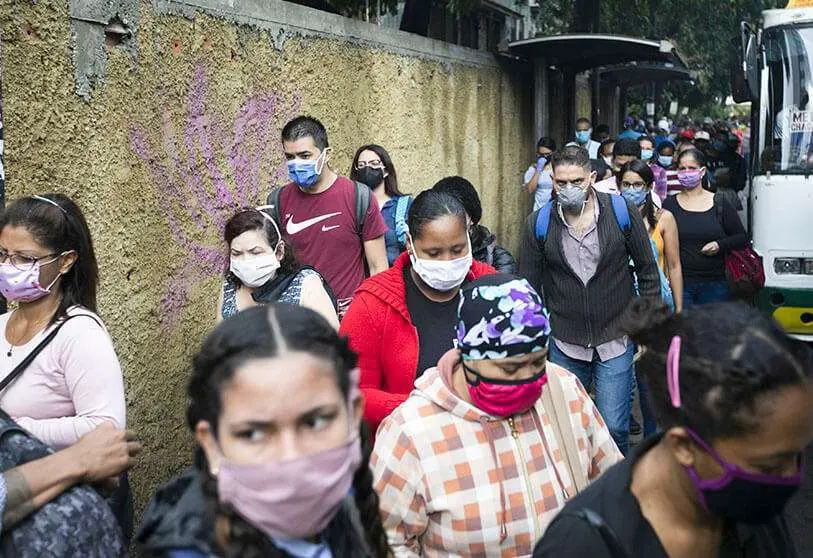Venezuelan women lead the struggle for the construction of a prosperous and democratic Venezuela

Venezuela, once one of the most prosperous countries in Latin America, is now one of the world's leading producers of refugees. The crisis in Venezuela is serious. Three quarters of Venezuelans currently live in extreme poverty while 95% of the entire population is below the poverty line. Economic devastation, human rights violations, the systematic destruction of the rule of law and corruption have turned life into a constant struggle.
The crisis has affected all Venezuelans, but the impact on women and girls has been particularly harmful. Venezuelan women are more likely to be unemployed or underemployed and many have suspended their education and careers to meet the basic needs of their families. In the absence of economic alternatives, record numbers of Venezuelan women have become involved in sex trafficking, forced labour and prostitution. As Venezuela's health system collapses, women's access to reproductive health care is dwindling. Teenage pregnancies, sexually transmitted diseases, and maternal and infant mortality have increased dramatically in Maduro's Venezuela.

A crisis that disproportionately affects women cannot be solved without them. The long-term solution for Venezuela must come from a negotiated and credible agreement that results in free and fair presidential elections. Hope for this was raised last summer when negotiations began in Mexico City between the Maduro regime and the United Platform, brokered by Norway.
As a member of the Unitary Platform delegation (which in total involves six women at the formal negotiating table), it was an unprecedented triumph when the parties agreed to include a gender approach during the negotiations. This is precisely the direction in which we must continue to push hard to bring more women into the process when it resumes.
Negotiations have been suspended since October. However, there is now hope that a new round of negotiations may resume soon. If this happens, it will be key that women are not only present at the negotiating table, but that they play a leading role in Venezuela's democratic transition.
The inclusion of women is key to the success of the negotiations and over the last decade, it has been women-led organisations that have led the struggle to achieve advances that improve the lives of the Venezuelan people.
Women-led organisations such as CEPAZ and Red Naranja have made visible the disproportionate impact of the conflict on women, the extent of sexual violence, and the steps needed to establish a democratic Venezuela. Groups such as EXODO have provided resources to refugees who want to know their rights, while the Frente Amplio de Mujeres has united women's voices in the opposition.
Last autumn, together with a group of Venezuelan women, we launched the Women for Democracy in Venezuela initiative, led by Venezuelan women committed to a free and democratic future for our country. This group is made up of women lawyers, bankers, academics, refugees, human rights defenders, diplomats, journalists and elected officials, who are working to generate a women-led solution to the current impasse and to amplify women's voices and demands on the international stage.
Despite the impasse in the negotiations, women-led organisations continue to work hard to improve the lives of the Venezuelan people and to create the necessary context for negotiations to succeed. We know that long-term solutions will depend on identifying those areas where Venezuelans can find common ground and this is precisely where Venezuelan women have sought to make progress.
One of the problems that needs to be urgently addressed is sexual and gender-based violence. Victims of sexual and gender-based violence are found on both sides of the political spectrum. A woman is murdered every 28 hours in Venezuela. Agreeing on a National Action Plan to counter gender-based violence, as has been frequently requested by women's organisations, is an important step and one on which the parties can reach agreement.

Another issue where consensus must be found is the environment. Over the last decade, Venezuela's Amazon region has been illegally exploited for gold, diamonds, coltan and other minerals, without considering the impacts on the environment and the indigenous communities that inhabit it. Both criminal groups and foreign insurgents have been given a free hand to plunder our lands, endangering our nation's biodiversity, contaminating groundwater and releasing toxic gases. In the process, this region has become a dangerous place, especially for the most vulnerable women and girls. Women-led organisations are advocating for an end to mining in our national parks, promoting sustainable agriculture as an alternative to mining, and demanding that indigenous peoples be consulted on any decisions that affect their future.
Women are also working to protect Venezuelan refugees and migrants. Over the past decade, millions of women and girls have been forced to flee their homes due to lack of access to health services, physical abuse, sexual and gender-based violence, discrimination and trafficking. However, only a smaller portion of Venezuelan refugees have such official status; the vast majority of refugee women remain marginalised, without access to basic rights and protection.
Venezuelan women from all political sectors have been working on these issues. They have developed concrete proposals to address them and should be considered by the parties to the process when negotiations resume. Progress on these issues, however minimal, can provide a basis for discussing other, thornier issues that are central to ensuring democracy and stability, such as electoral integrity, democracy, the rule of law and the need for justice and accountability.
Venezuela has a long and illustrious tradition of women coming together to bring about positive change. We must continue this legacy. And when political negotiations resume, we must ensure that the women who are rebuilding Venezuela today are meaningfully included in the construction of a prosperous and democratic Venezuela.








